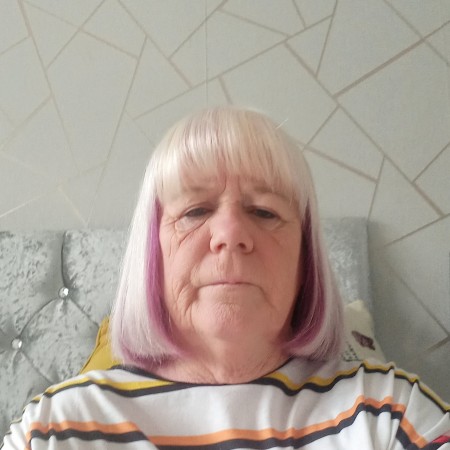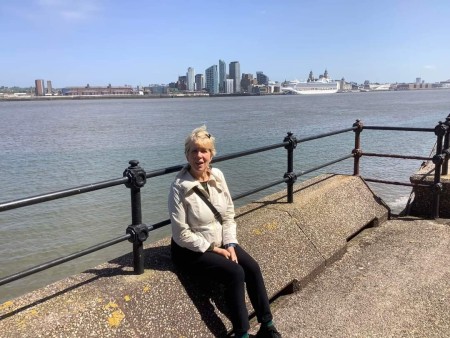Aintree University Hospital’s new Stroke Emergency Assessment Centre (SEAC) has been praised by two patients who have made a significant recovery enabling them to care for grandchildren and continue with plans to travel across the world just days after their treatment.
Debbie Patterson, 63, was at home in Croxteth taking care of her grandchild when she began experiencing stroke symptoms. “I started getting chest pains, my speech became slurred, and my face began to droop. I was so fortunate that I was able to act fast and contact my daughter-in-law who took me straight to Aintree Hospital,” said Debbie.
Debbie was taken straight to the £1.5 million purpose-built assessment centre, the first of its kind in the UK, where within 30 minutes of her arrival, the hospital’s specialist stroke team were able to deliver thrombolysis, a treatment for acute strokes which breaks down blood clots, helping to restore blood flow to the brain.

Once Debbie had received her treatment, she was admitted to the hospital’s Hyper-Acute Stroke Unit (HASU) where she spent five days recovering before being discharged.
Opening last year, the HASU is dedicated to caring for people in the critical 72-hour period after a stoke occurs. After treatment here, patients will either be able to continue their recovery at home or may be transferred to acute stroke care in Aintree Hospital, Broadgreen Hospital or Southport Hospital, depending on which is nearest to their home.
Debbie said: “The team at the SEAC were amazing and the whole process felt seamless. I couldn’t fault my care in the HASU either, the doctors and nurses were so attentive and I felt like nothing was too much trouble for them.
“I’ve been able to continue with life as it was before my stroke. I’ve been out shopping, gone for breakfast with loved ones and been able to look after my grandchildren. If it wasn’t for the teams at Aintree, I don’t know where I’d be.”
Patients that are assessed at the SEAC and need a thrombectomy – a procedure to remove a blood clot that is causing a stroke by blocking blood supply to an area of the brain, can also benefit from the centre’s close proximity to The Walton Centre NHS Foundation Trust. This specialist neurosciences hospital next door to the SEAC provides thrombectomy treatment within the required time window, which is typically up to six hours after stroke symptoms begin.
67-year-old Anna Reid was one such patient who received a thrombectomy, after suffering a stroke at home in Mossley Hill. Anna was brought by ambulance to the SEAC where she was quickly assessed and underwent three scans, including one which utilised AI technology to determine how much of Anna’s brain was at risk. She was then transferred to The Walton Centre for her thrombectomy and further treatment. Afterwards, Anna spent three days recovering in Aintree’s HASU before returning back home to her husband.

Anna said: “I knew something was strange when I woke up and I’d lost the feeling in my right arm and couldn’t speak properly. My husband called an ambulance and I was taken straight to the SEAC. The partnership between Aintree Hospital and The Walton Centre is great, I was scanned three times at Aintree before being transferred for my procedure which was really successful.
“My recovery has been incredible; you wouldn’t know I’ve suffered a stroke by looking at me. Within two days of being discharged I was visiting friends and family and planning when I could go back to my walking club. I also felt fit enough to return to my spinning gym classes just over a week after my procedure. Prior to my stroke, I was planning a trip to India and thanks to the wonderful care I’ve received, I’m still able to go.”
Dr Nibu Thomas is Clinical Director of the North Mersey stroke services, which covers Aintree, Royal Liverpool, Broadgreen and Southport Hospitals, said: “I’m delighted that Debbie and Anna are recovering so well, they are both perfect examples of the benefits that the SEAC can bring – rapid access to assessment and treatment that can lead to significantly lower time in hospital and faster recovery meaning many of our patients can get back to their normal day to day routine more quickly.
“The team and I are proud to be a part of the SEAC that has already seen over 560 patients. The centre, combined with the HASU, enables us to provide the very best of care to stroke patients, like Debbie and Anna, in the North Mersey region.”
Last month the stroke team received an overall score of ‘A’, the highest score possible, in their Sentinel Stroke National Audit Programme (SSNAP) report, which is part of a major national healthcare quality improvement programme to improve the quality of stroke care in England, Wales and Northern Ireland.
The video below is a report from BBC North West Tonight which aired on October 24 2023.
The video below is a report from BBC North West Tonight which aired on October 29 2024.